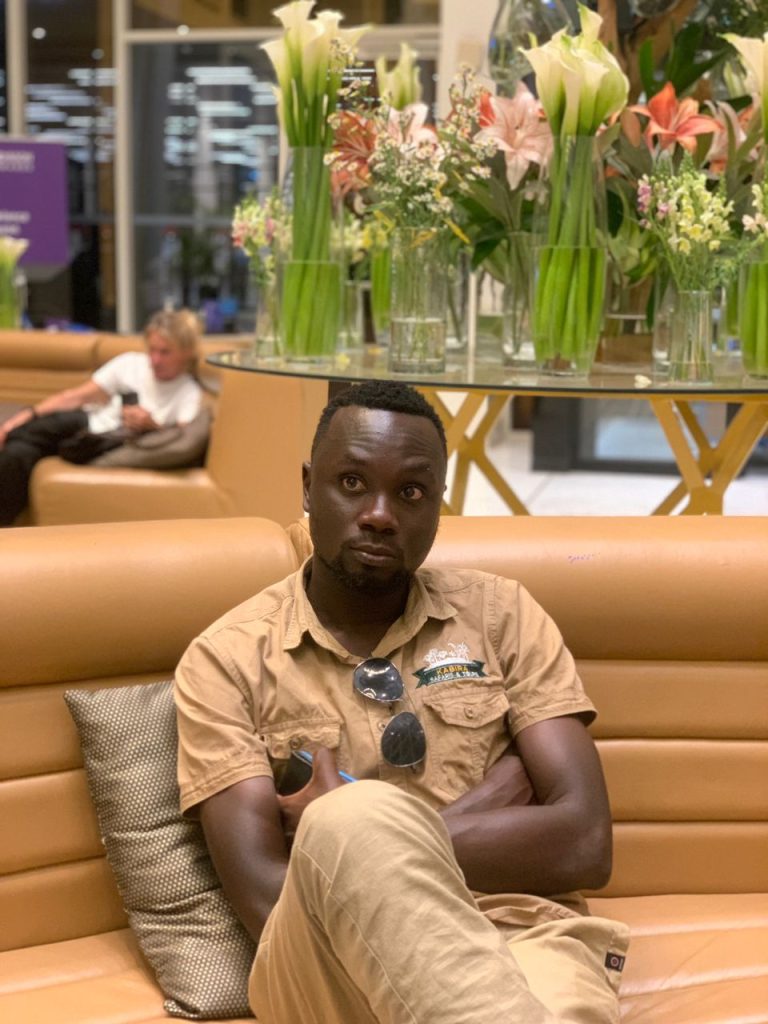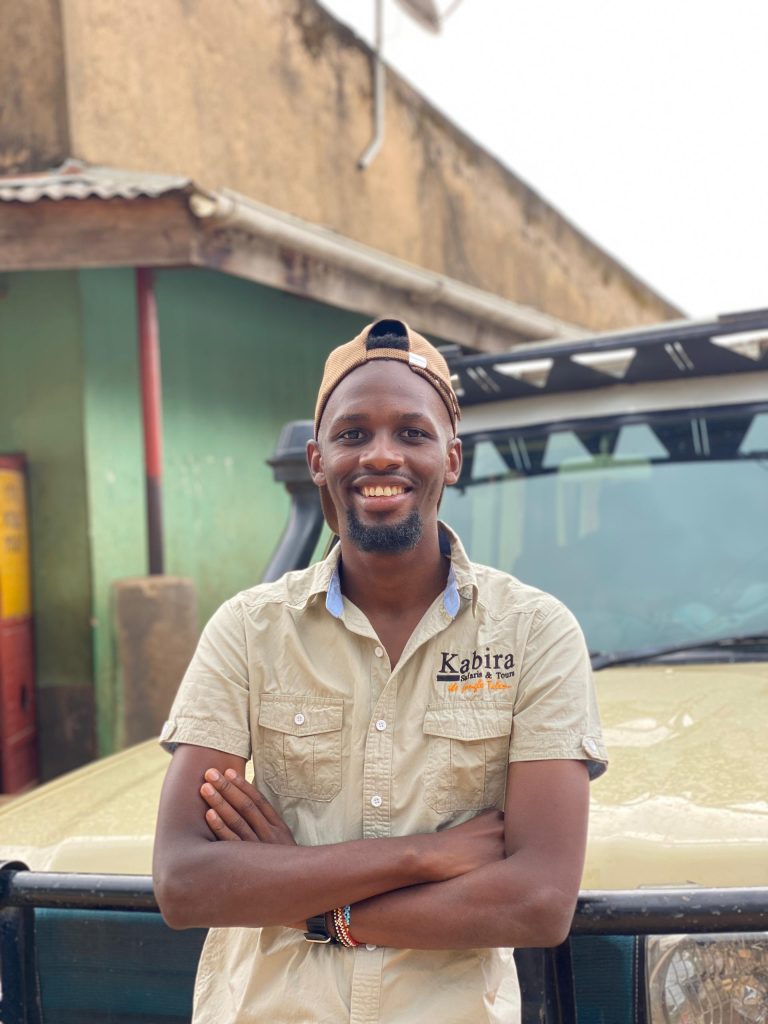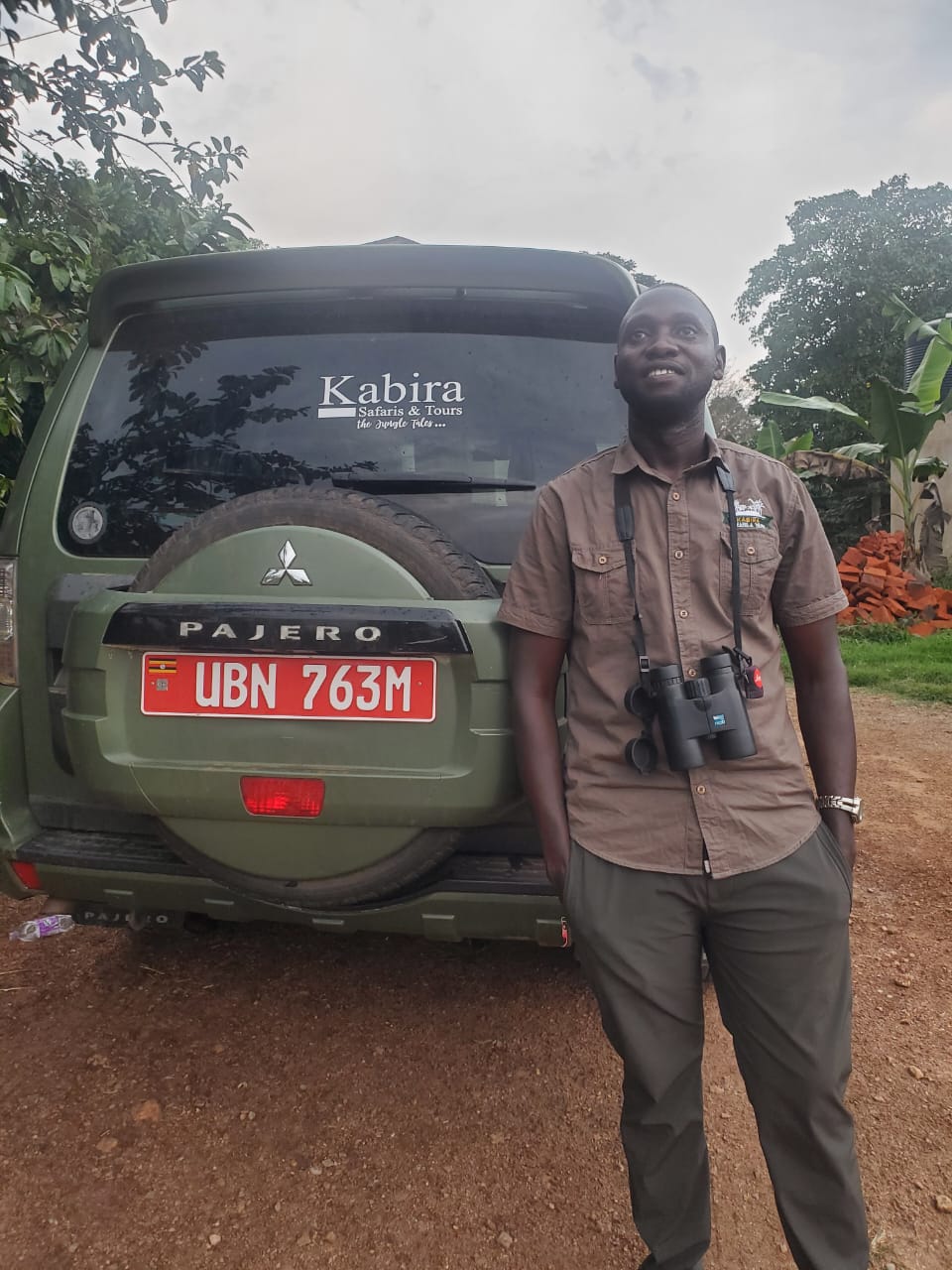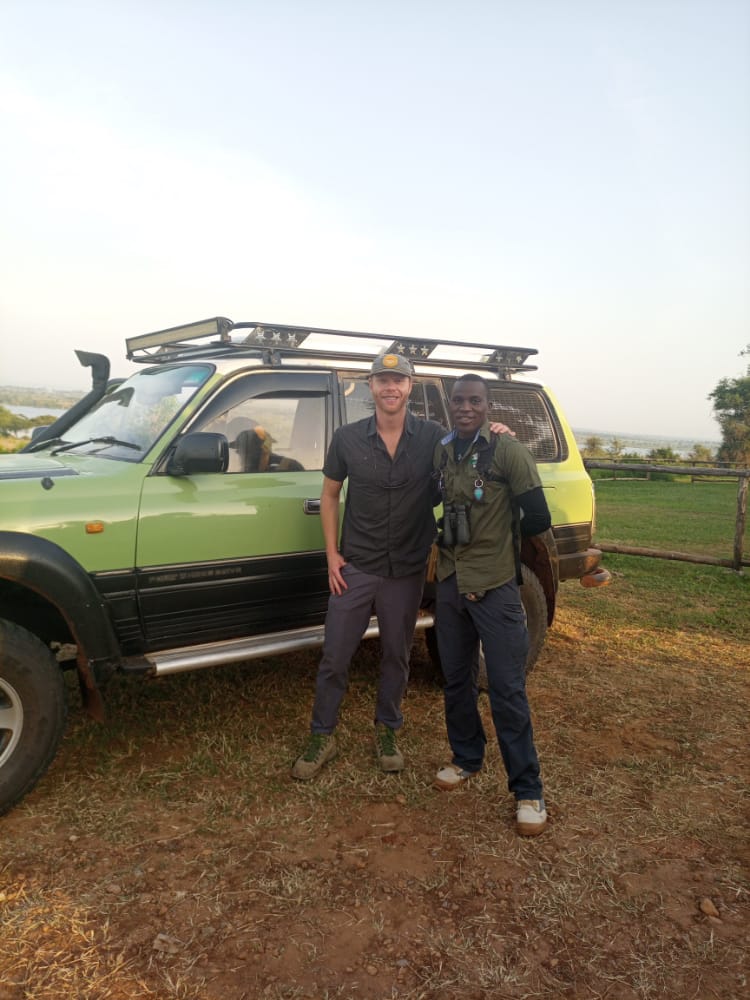The Official African Safari Guides at Kabira Safaris & Tours Africa
Making It Happen: Africa Safari Guides & Trackers
So, what does it take to be a successful African safari guide? First and foremost is safety, especially on walking safaris, which necessitate a level head, respect for dangerous animals, and a solid understanding of animal behavior. A smart African safari guide can read situations, comprehend animal behavior, and respond quickly to prevent placing his customers in danger.
Second, one must be able to read and understand the natural world; someone who can read animal footprints while others read a newspaper, identify every bird call and be an inspirational source of knowledge on everything living above and below ground. Personality is also crucial; he or she will be the ideal host, a natural raconteur with an endless supply of anecdotes to keep customers engaged around the campfire.
Samuel Mukalazi – Our Senior African Safari Guide
Samuel Mukalazi Biography: Wildlife Tour Guide & Film Maker
Born and raised in Uganda, Samuel Mukalazi is an informative friendly wildlife safari guide who Knows Uganda and Rwanda by the head, he holds a diploma in wildlife film production, and during his free time, he always covers stories in the wild and African culture which he shares on his social media platforms wildlife platform and YouTube Channel. so as to inspire more people from all over the world to fall in love with wildlife and African culture.

Samuel Mukalazi
Allanie Byamukama: Our Lead African Safari Guide
Biography: Allanie Byamukama – A Uganda-Rwanda Wildlife Enthusiast Guide
Hey there! I’m Allanie Byamukama, a Ugandan-Rwanda wildlife enthusiast with a passion for sharing the secrets of the savannas and forests. With 7 years of experience leading safaris, I’ve got the inside scoop on where to find the best wildlife viewing spots and hidden gems that only us locals know about.
Growing up in Uganda, I was surrounded by the sights, sounds, and stories of the wild. My love for nature and culture only grew stronger with time, and I’ve dedicated my career to sharing that love with others. From the majestic lions of Queen Elizabeth National Park to the ancient traditions of the Batwa people and the Stunning marriage traditions in Rwanda I’ll take you on a journey that’s equal

Allanie Byamukama The Guide
Herman Kisakye – Our Head African Safari Guide
Herman Kisakye Biography: Our Head Birder, Botanist, Wildlife + Butterfly Safari Guide
Herman is a humble young man with a lot of passion to learn. He attained a course on tourism management He started as a site guide with National Forestry Authority in one of the biggest rainforest of Uganda where he practiced all the birds by calls for 7 years he has done a lot of research as a research assistant on biodiversity surveys in different ecological habitats in parts of the country with different researchers, Bird monitoring with Nature Uganda. Herman has the zeal of learning at all time that is why he has moved from being a site to a safari guide. He is knowledgeable on birds, botany, wildlife and butterflies. He has been trained and he is a member of Nature Uganda, Uganda Safari Guides Association (USAGA) and Uganda bird guides club.

Herman Kisakye
Arshley Brian – Our Lead African Safari Guide
Arshley Brian Biography – Senior Birding, Wildlife & a Botanist
Arshley is a friendly young man born and raised in Uganda’s most visited National park (Queen Elizabeth National Park). where his father worked as an interpretive guide. Arshley’s interest in wildlife started when he was just 7 years old as he enjoyed watching wild animals that always roamed around his family home. Through this early passion, Arshley Brian then underwent academic studies and after completing at an advanced level with good results he was awarded a free scholarship at the International University Of East Africa where he pursued a bachelor’s Degree In Tourism Operations and Forestry the course he believed to have studied with passion.

Arshley Brian
Making It Happen: Africa Safari Guides & Trackers
Even though you’ve traveled all this way to see the Big Five, your African safari wouldn’t be possible without the safari guides.
An African safari would not be complete without your guide. What is a guide, anyway? Well, it will be filled with his (or her!) expertise of the area you’re going and the animals you encounter. Do you use the same driver? Are they able to be interchangeable? Who is the man in the front, perched on a bucket seat, in the 4×4?
Lodge African Safari Guides & Trackers
A specially modified 4X4 game watching vehicle will transport you on safari drives if your agenda includes visiting multiple lodges. Your safari guide will be behind the wheel.
These professionally educated, environmentally conscious guides live on-site at the lodge where you’re staying and know the area and its animals inside and out. Guests can rely on these men to keep them apprised of any sightings, such as the location of the wild dog pack’s den or the spot where a pride of lions killed a buffalo the day before. At most lodges, you’ll have the same guide for the duration of your stay, and you might even end up having meals and conversations around the table with them.
It is common practice to have a tracker, who sits fairly exposed on the front seat of the 4X4, accompany the game viewer. The private reserves of South Africa’s Kruger, KwaZulu-Natal, and Eastern Cape, as well as a few concessions in Botswana, employ these keen-eyed guides due to their exceptional ability to follow animal trails.
Evening lectures given by lodge’s resident wildlife specialists, who generally have extensive knowledge of the local ecosystem, are a common component of many lodges’ offerings. Additionally, lodge guides can arrange for visitors to see local villages, including their own, and go on guided nature walks.
Drivers & Guides
Alternatively, a different kind of safari guide is used on mobile safaris around Africa. There will always be a driver/guide to keep you safe, whether you’re taking a guided minibus tour of Kenyan parks at a certain time or going on an adventurous camping trip in Botswana. A professional driver/guide will take care of everything: getting you where you need to go, setting up your campsite and cooking your meals, taking you on game drives, and solving any problems that may arise.
In larger campgrounds, you might find a cook and an assistant, but in more opulent, Hemingway-style mobile homes, you might find butlers and housekeepers as well.
Specialist Guides
Perfect for day visits and special interests, professional guides are brimming with passionate information about specific areas. Specialist guides are available for tours of the dramatic Battlefields region in KwaZulu-Natal, botanical hikes up Table Mountain, and bird watching in the Okavango Delta; however, you should book in advance because availability is often an issue.
Also, many lodges have experts that specialize in certain areas, like “bird guys” or “big cats.” Before you book, inquire with your travel agent about the possibility of pairing up with a particular lodge guide who shares your interests.
Transfer Drivers
Your transfer driver, who will transport you from one location to another (often between an airport and your lodging) on your African safari, may be the first person you encounter.
They are well-versed in the area’s roadways and will take you there securely. Longer excursions to game reserves might be accompanied by knowledgeable guides who are well-versed in the local flora and fauna, increasing the likelihood of seeing wildlife.
Tipping your African safari guide
Although it is entirely up to you, it is common in Africa to tip safari guides. Many individuals seek for tipping rules because it is a sensitive and complex matter. This is our recommendation.
- Transfer drivers: USD 10 -20 per transfer
- Lodge guides: USD 10 – 20 per couple per day
- Trackers: USD 5 – 10 per couple per day
- Driver and tracker: USD 20 – 30 per couple per day (give the tip to the driver who will then split it)
Lodge staff: Guests are asked to use the staff tipping box, which is shared amongst all lodge employees, as a simple means of tipping the cooks, housekeepers, and porters upon checkout. Earn ten dollars daily each person. If you would like to express your gratitude to an individual who has particularly stood out for their outstanding service, you can do so by placing your tip in an envelope labeled with their name or by transferring it through the camp manager.
It should be noted that certain camps offer the service of a butler. A daily tip for the butler, if desired, should range from $5 to $15.


